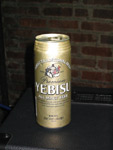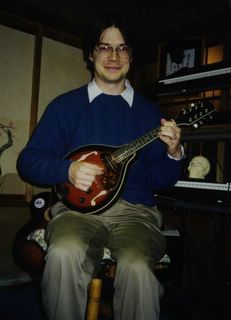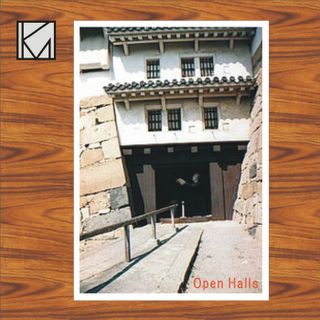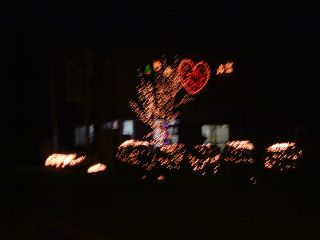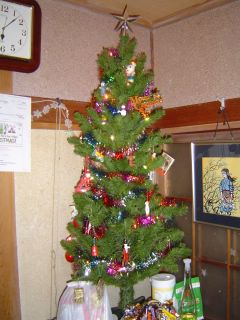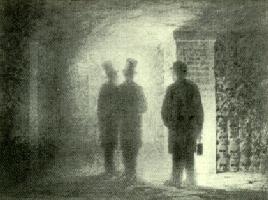(Okay, by popular...or at least Snabular...demand, I give you "What Happened Next".)
Needless to say, we are all both high on life and totally exhausted after the applause finally ends and the hall lights come on at the Kashima Workers' Culture Hall. Congratulating each other between pants (as in fast, hard breathing) and giggles of disbelief, we meander our way off the stage, occasionally tripping over music stands (or the contrabassoon) along the way. Quickly separating into our respective groups, we head for the dressing rooms to change and try not to faint. Tired but happy banter fills the "male regular members' dressing room".
Chuck is conspicuous by his absence.
I take my two clarinets apart slowly and give them a good cleaning and oiling. They deserve it, after all. Instruments have personalities, you know, and these two are particularly moody. I have to thank them when they're cooperative. Then I put on my "civvies" and head out into the hallway to find it strangely empty. After that, I go back to the stage to help with cleanup, but it's already almost finished. Apparently the group mobilized quickly with quite a lot of available hands, and I'm a latecomer. There's still a lot to do, though. After all the instruments are in the truck and the stage gear stowed, we get ready to head over to the school to put the instruments away.
When I head into the hallway leading toward my car, I find Janka's manager/interpreter/driver/piano tuner standing all alone looking rather morose. I ask him if he's going to the party, and he replies by asking me darkly how to get there. I give him some easy directions, and then I head on my way. It's then that Chuck suddenly comes running in, still in his "fake tux" and bow tie, panting and wearing a big smile.
"Where've you been?" I ask.
"Oh, I got dragged out to the lobby to play interpreter for Yanka," he replies cheerfully between pants. "I mean, literally
dragged out by the arm! You wouldn't believe the crowd of people that wanted her autograph! Most of the Seishin students...and about half the audience... Too bad I can't speak German, right?"
Apparently not, Art. Time to go.
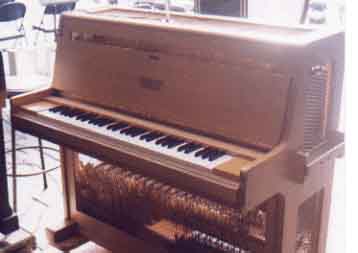 Celeste
CelesteWe arrive at ye olde academy to find that the night watchman (hired from a private security agency) has parked his car right where the truck needs to back in. I and Ms. Mu, Kashima Phil's only regular percussionist, go inside and split up to search for him in the sprawling, darkened corridors. Luckily, he turns up almost immediately. After he moves his car, the truck backs in, and soon we have a veritable caravan of people lugging up items ranging from double basses to assorted bits of the xylophone. As usual, the tympanis, harp, and celeste are
loads of fun to pack up all those stairs (NOT!). It is fortunate that we have a lot of man(andwoman)power on hand, because we get everything put away with amazing speed.
 Forte
ForteChuck is
still in his tux when we load up in our cars and drive the very short distance to Forte, the cozy, little "coffee & wine tea room" that has always served both Seishin's music club and the Kashima Philharmonic so well over the years. The couple that live/work there have always been among our most loyal and devoted supporters. We always have our after-concert parties there. As usual for this time of year, it is all decked out with Christmas (no, NOT "HOLIDAY") lights and ornaments. Inside, it is warm and homey, with a generous supply of food laid out buffet style. There is also an ample supply of wine, which I have to try to avoid since I have a long drive home.
Ms. St, who was the "second-chair 1st clarinet" through the whole program (While Mrs. Ogawa and I traded off between "first-chair 1st and first-chair 2nd"), is at the door with the moneybox. It's a good thing Chuck has the exact amount, because, as usual, I wipe out her change supply.
Most of the regular members (that didn't help with cleanup) are already here together with most of the professional extras. Mr. and Mrs. Ogawa are here, as are the Simowitsch sisters and their manager.
As usual, seating is at a premium. I chat cordially with the Simowitsches for a little while, but there is nowhere to sit nearby, so I head for the nearest open seat, which is way over in the corner out in the hinterlands between some middle-aged ladies from the Lupinus Choir (DON'T...!). After I've seated myself, Janka quickly scoots over and invites Chuck to join them.
Hmmph. I know when I'm not wanted.
I allow myself my one beer of the night for the opening toast, and then I dig into the food. As usual, it's like a feeding frenzy at the buffet, and I'm too mild-mannered (like Clark Kent) to plow my way through like some people, so I just sort of wait for openings to exploit. Then I sit down in my corner with my heaped plate, whereupon the Lupinus ladies immediately tear into me with a barrage of the usual questions about my life, my wife, my children, my lifestyle, how old I am, whether or not I can actually use chopsticks, blah blah blah. I'm used to the routine by now, as it's par for the course for being a foreigner in the Land of the Rising Sun. Besides, I'd much rather be asked annoying cliche questions in a warm, friendly manner than be ignored or ostracized.
A few meters to my left, just audible over Janka's giggling, I hear my name mentioned more than once, but I have no idea what they're talking about. That rankles. Unfortunately, after having lived in a non-English-speaking country for fifteen years, any English within earshot sticks out like a sore thumb and immediately grabs my attention. It's also impossible to ignore even if I try. I'm feeling too tired and moody to put up with this gracefully, so I just try to keep myself distracted with my dinner. Then, in a rather loud voice, Chuck says something like, "How could I be anything but overjoyed to be in the presence of two such lovely ladies from Germany?"
Ach, Gott. (Cue sound of someone shoveling manure.)
My appetite immediately comes to a dead halt, and it's all I can do to keep what I've already eaten down. I go to grab a glass of tea, and when I do I throw a quick glance at Janka's manager, who is sitting quietly in his own corner and staring gloomily into space. I know he speaks a fair amount of English, but I really hope he isn't understanding any of this. As for me, I return to my corner and amuse (distract, more like) myself reading the pile of questionnaires from the two concerts. Unlike previous concerts, every comment I read is good. I guess that's enough to ease my indigestion.
As I sit and read, it comes to be the customary speech time. Mr. Ogawa starts, and for once he has only good things to say. (In the past he has often launched into a blistering tirade about people's sloppy rehearsal habits and consequent poor performance. This time he doesn't.) He is clearly very happy about the concert we pulled off tonight...and also relieved. After that, the spotlight is turned over to the professional extras, four of them, actually. The content of their speeches drifts into a slow haze as I get more and more wrapped up in the questionnaires I'm reading. Eventually I'm tuning the whole proceedings out altogether.
I...hai-hai...have become...comfortably numb...Actually, no I haven't. Almost everyone else is drinking copious amounts of wine or beer, and the levity (and decibel level) is increasing. Unfortunately, I'm being tragically sensible. Being sober among drunk people rather spoils the fun (even without Steve ;-) ), so I'll just keep reading these questionnaires.
Then, all at once, everyone starts shouting my name, and someone yanks the papers out of my hands. What, do they want me to give a speech? Actually, no. They want me to interpret Yanka's speech. I try to decline, saying (with total honesty) that I'm probably too tired to translate German to Japanese. No such luck. The crowd is adamant (in an intoxicated sort of way). There's no escape for this worn-out minstrel.
Actually, the interpreting goes quite well for a while at least. I understand everything that she says, and it's pretty simple to put into Japanese. Then she says two different expressions that translate the same way in Japanese, so I wind up saying the same thing twice. That sets off a chorus of guffaws. After that, she says a long, fast sentence. I understand the first half, but not the second, so I ask her to repeat it. The second time I follow, but I'm not sure how to put it into Japanese, so I ask her to repeat and let me translate just the first half first. As I pause to think about the second half, Jana, sensing trouble, jumps up and reiterates what Janka has just said in English. I assure her that I'm alright, and then I continue. It all comes to a comfortable conclusion, and I sigh deeply as everyone applauds.
Actually, there are two others here who speak German quite well...possibly even better than me. One is our lead cellist, Mr. Ohe, who lived and studied in Germany. The other is Mr. (or should I say prof.?) Sugiyama, one of the extras, who is a horn player and teacher at the reknowned Musashino College of Music. Mr. Ohe is rather shy, so he is slinking around in the shadows, but Mr. Sugiyama comes over at this point, and he, I, and Janka chat for a while auf deutsch. She surprises us by telling us that the Kashima Philharmonic actually played the Tchaikovsky Concerto significantly better than many if not most of the European orchestras she'd played it with before, and she has played it with quite a few (including the Berlin Philharmonic). She also says that European and American orchestras tend to be nowhere near so friendly. She and Jana have never experienced a party like this one, and it's a bit of a surprise for them.
Janka is also rather (overly) concerned about her performance in the second concert. As I mentioned in an earlier post, she had been put on edge by the problem-wracked rehearsal, so her confidence was shaky. I assured her that most of the trouble stemmed from the fact that we had just gotten a little too accustomed to our rehearsal pianist, who had played the notes well but not the
music. Janka still doesn't seem convinced.
"Well, if you want a critical comment," I say to one of the world's most famous up-and-coming pianists, "I did notice that you were putting less feeling into your playing in Kashima than you did in Kamisu. You were playing it safe. But it's not that big a deal. Even when you're not really at your best, it's still wonderful, because you play that Concerto the way it
should be played."
That seems to be exactly what she wanted to hear, because her mood changes immediately for the better. She does, however, get her revenge. She apparently listened to both concerts backstage, she knows exactly where I f****d up in "Pictures at an Exhibition" during the Kamisu performance, and she tells me so. But apparently my Kashima performance passed the test.
Suddenly Ms. Miyazawa, Seishin's vocal music instructor and director of the Lupinus Choir, comes up with a present for Janka. This is followed by presents from Mr. and Mrs. Ogawa. As it turns out, the Simowitsch sisters also have presents of their own to give people. After giving her present to Mr. Ogawa, Janka comes over to Chuck and me wearing a big smile and holding two boxes, both tied up with a red-and-green ribbon. One is noticeably bigger than the other.
"These are for you," she says playfully. "I'll let you choose."
Chuck and I stare at each other for a while, and then I say, "I'll tell you what: since you're younger, friendlier, and more handsome than I am..." Art G. takes both the hint and the larger box. Paul S. is content with the smaller one. (It turns out to be a hand-carved wooden Christmas tree ornament. Quite beautiful, actually. It will definitely see use this year.)
While all this has been going on, the video of the Kamisu performance has been playing in the background. We're right in the middle of the Tchaikovsky Concerto. I go over to the buffet to grab some dessert, and Stone (the sax player) comes over feeling very insecure. He's not accustomed to playing with an orchestra, and both his tone and his style (not to mention his staying in tempo and on rhythm) were a matter of concern from the beginning. I reassure him that, despite whatever imperfections there may have been, he did a good job. He replies that he still intends to go outside for a smoke when "Il Vecchio Castello" (his solo) comes up.
 Was this Hartmann painting the inspiration for "Il Vecchio Castello"? Experts aren't certain.
Was this Hartmann painting the inspiration for "Il Vecchio Castello"? Experts aren't certain.Speaking of going outside, it's past 11:30 p.m., and tomorrow is Monday. If I need anything right now (other than a few drinks) it's a good night's sleep. It's time to hit the road. I say a round of goodbyes, and then Janka asks me if I could translate some of the more relevant questionnaire comments and send them to her. I say of course.
When I ask her how I should send them to her, Chuck smiles and says very deliberately, "Don't worry. I have both her mailing address and her e-mail address. You'll be in touch, right?" I answer in the affirmative, sighing inwardly. Then, when I start to leave, Chuck leans over and asks me quietly in a "hey, dummy" tone if I've asked her for her autograph yet. I haven't, so I tell them I'm going to run to my car and get my copy of the Concerto music for her to sign. Janka follows me outside, but she stands and waits patiently by the cafe door (in short sleeves in the near-freezing night) as I sprint to the BLUE RAV4, which is parked over in the weeds, and bring back my music. She's not accustomed to signing autographs, and it has all been a bit bewildering for her, but she has some fun with it.
For good measure, I ask Jana to sign it, too. I've been wondering what it has been like for her, traveling around in her kid sister's shadow, but she seems perfectly content and having a good time. She still seems to appreciate the gesture of acknowledgement, though.
(In retrospect, I probably should have had their manager sign it, too. He looked rather alone and unwanted.)
I give a final round of goodbyes, and then the BLUE RAV4 is purring in the still, frosty night as it heads toward Namegata City again. Not knowing exactly why, I pop on "Open Halls", the latest of my homemade CDs, and crank it up loud. Yes, it's clearly a very amateur effort, but it's mine, and I'm rather proud of it. The same goes for the Kashima Philharmonic. Now I have my loving wife and a couple of cold Yebisus to look forward to. :)
